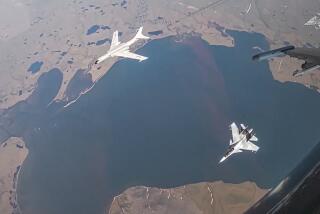Work for Safeguards With China
- Share via
The standoff with China over the fate of the 24 interned crew members of a U.S. reconnaissance plane has been resolved, but the fallout from this mini-crisis promises to linger. China is eager to be accepted as a major global player and Asia’s preeminent power, an ambition its military buildup seeks to make more credible. All this makes America’s friends in East Asia nervous and assures that U.S. monitoring of China’s growing military capabilities will continue. The Navy EP-3 that collided with a Chinese fighter plane 11 days ago was part of that surveillance activity. The compelling need for the two sides now is to adopt measures that will lessen the chance of future accidents.
Beijing did not get the apology from Washington it had demanded, for the United States rightly refuses to accept responsibility for a collision in international airspace that, so far as is known, occurred when the fast-moving Chinese fighter flew into the path of the lumbering EP-3. But in its note to China the United States did twice say it was “very sorry” for the death of the Chinese pilot and for failing to get China’s permission before its plane landed on Hainan. This arduously negotiated language allows China to assert that it won a moral victory, while the United States can say it simply expressed humanitarian sympathy and regret.
What happens to the EP-3 and other matters will be taken up in bilateral talks scheduled for next week. The Bush administration should not miss the chance then and in other contacts to drive home to the Chinese the gravity of this incident. It was only by a miracle that the severely damaged U.S. plane wasn’t sent plunging into the South China Sea. Had that happened, members of Congress would have lined up to denounce China for committing an act of war and demanded a harsh response. As it was, President Bush and Secretary of State Colin L. Powell, after a shaky start, handled matters appropriately with the combination of tact and firmness required. They should use equal tact and firmness to get China to help develop steps aimed at avoiding future dangerous encounters.
Bush drew some criticism during his presidential campaign for referring to China as a strategic competitor, but he was right. In Asia and elsewhere, the interests of the two countries often impinge and conflict. But within that competition have developed economic links of significant value to both nations. The durability of those ties depends on maintaining an essential level of political trust. China’s handling of the April 1 incident has been a blow to that trust.
More to Read
Sign up for Essential California
The most important California stories and recommendations in your inbox every morning.
You may occasionally receive promotional content from the Los Angeles Times.













